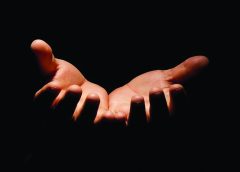
Duaʿ is a priceless blessing that makes us closer to Allah Subhanahu wa Taʿala in every moment of life.
Every perfection of the creation which is praiseworthy belongs to Him. Therefore, the praises are to Him. The praises from azal (pre-eternity) to abad (post-eternity); from whoever to whomever; in the past or in the future are all to Him. Because blessing, favour, perfection, beauty and means of thanks all of which deserve praise or admiration belong to Him.
Oh Allah! Bless our beloved Prophet Muhammad Sallallāhu Alayhi Wasallam, his family and his companions with a blessing that will continue as long as your domain continues.
Man is afflicted with many small and big calamities during his life, and cannot get rid of them with his own power and effort. On the other hand, he has innumerable desires, but he cannot fulfil most of them. Since we are weak against the calamities, and poor to fulfil our desires and wishes, this necessarily urges us to search for someone who is stronger than us, who can do everything and who is merciful. It is a human nature to turn towards the mercy and power of Allah (swt) by praying. Man needs to turn towards Allah (swt), and to pray as much as he needs food and water.
As it is in human nature, Allah (swt) also tells us ‘to turn towards Him and pray to Him,’ and so He will answer our prayers with His mercy and favour. Allah (swt) encourages us in the Qur’an al-Karim as follows:
“And when (O Messenger) My servants ask you about Me, then surely I am near: I answer the prayer of the suppliant when he prays to Me.”1
“Say, ‘What would my Lord care for you if not for your supplication?’”2
“Call upon your Lord in humility and privately.”3
Praying was indispensable in every moment of our Prophet’s life and in his words, and he was the role model to us and applied the Qur’an in life best. We say every moment, because he used to pray every period of the time during a day: while entering home and going out, while getting to work, when morning comes and it gets dark, after meals, when he goes to bed, and many other times of the day. For instance, ablution prayers during taking wudu, many and various comprehensive prayers in the salahs, at the sermon, entering a mosque and going out, in the blessed nights, at the funerals and during many worships; he never neglected to pray even for once. He also taught many prayers which relieve us materially and spiritually during the hard times when people are in great need of prayers like distress, indebtedness and illnesses.
Our beloved Prophet (saw) encouraged us to pray:
“Prayer is worship.”4
“Prayer is the essence of the worship.”5
“Allah is He Who gives life and is very generous. He does not turn His suppliant servants down by returning them empty-handed.”6
“Prayer is the key to the mercy of Allah.”7
“There is nothing nobler in the sight of Allah than duaʿ.”8
There are many other encouragements of our Prophet like these.
It is also the prayer that will cleanse our hearts and souls from sins and will make us sinless in the sight of Allah (swt).
A believer with iman al-tahqiq (verified belief) is never deprived of prayer; because that strong faith will always lead him to his Lord and he will find the real peace in sincerely supplicating to Allah (swt).
There is not a determined time for prayer. Allah (swt) wants to be remembered in every situation in the following verse: “Those who remember Allah standing and sitting and lying on their sides.”9
A person who prays in every period of his life is honoured with the verse “Remember Me; I will remember you.”10 And to be remembered by his Lord is such great and invaluable blessing for a believer.
In this transient life, if we still do not have daily awraad and azkaar, and if we do not have a time with our Lord in private, then we must come to our senses, repent for it and set the things right in our life.
When we look at the waliullah (Muslim saints) in the history, we see that prayer had an important place in their lives, that they had an unshakable bond with their Lord. This can be clearly seen in their supplications some of which were their own. We should keep it in our mind that duaʿ is an important means for us to be close to them in the hereafter.
However, the most important thing we should know about prayer is that it is both actual and verbal. In other words, we should properly do everything that needs to be done and then pray verbally.
As a matter of fact, if we look at the prayers of the Prophets in the Qur’an al-Karim, we see that they always supplicated to Allah (swt) along with their actual prayers.
References:
1- Baqarah, 2:186
2- Furqan, 25:77
3- Aʿraf, 7:55
4- Tirmidhi, Daawat, 1, h.no: 3372
5- Tirmidhi, Daawat, 1, h.no: 3371
6- Tirmidhi, Daawat, 105, h.no: 3556
7- Kanzu’l-‘Ummal, v.2, p.62, h.no: 3116
8- Hakim, Mustadrak, v.1, p.490
9- Al ʿImran, 3:191
10- Baqarah, 2:152

